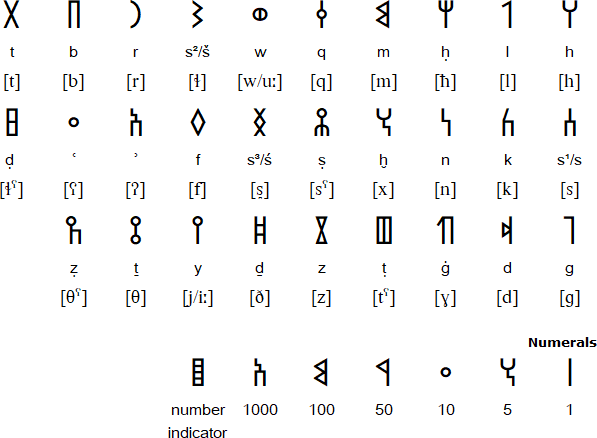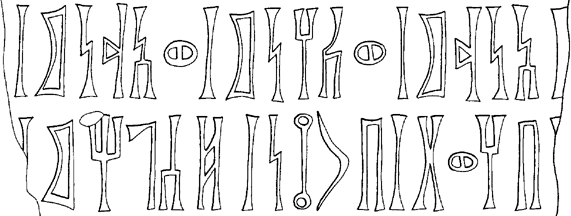The South Arabian alphabet is thought to have developed from the Proto-Sinaitic alphabet in about the 9th century BC. It is known from inscriptions found in Eritrea, Babylonia and Yemen dating from between 9th century BC and 7th century AD, and was used to write Sabaean, Qatabanian, Hadramautic, Minaean, Himyarite and proto-Ge'ez, extinct Semitic languages once spoken in southern parts of the Arabian peninsula. It is also known as the Old Yemeni alphabet or المُسند (musnad).
The South Arabian was used for monunmental inscriptions, and was also carved into wooden sticks, which were used as everyday documents. It is also know as the Old South Arabian script or Ancient South Arabian script.

Download an script chart for South Arabian (Excel)

Source: http://www.barnard.nl/yemen/mb88.html
Information about the Old/Ancient South Arabian script
http://en.wikipedia.org/wiki/South_Arabian_alphabet
Ancient South Arabian Inscriptions
http://www.barnard.nl/yemen/
http://dasi.cnr.it/
Old South Arabian fonts
https://fonts.google.com/noto/specimen/Noto+Sans+Old+South+Arabian
Ancient Berber, Arabic, Aramaic, Chorasmian, Elymaic, Hatran, Hebrew, Manichaean, Nabataean, North Arabian, Pahlavi, Palmyrene, Parthian, Phoenician, Paleo-Hebrew, Proto-Sinaitic / Proto-Canaanite, Psalter, Punic, Sabaean, Samaritan, Sogdian, South Arabian, Syriac, Tifinagh, Ugaritic
Page last modified: 13.04.23
[top]
You can support this site by Buying Me A Coffee, and if you like what you see on this page, you can use the buttons below to share it with people you know.

If you like this site and find it useful, you can support it by making a donation via PayPal or Patreon, or by contributing in other ways. Omniglot is how I make my living.
Note: all links on this site to Amazon.com, Amazon.co.uk
and Amazon.fr
are affiliate links. This means I earn a commission if you click on any of them and buy something. So by clicking on these links you can help to support this site.
[top]